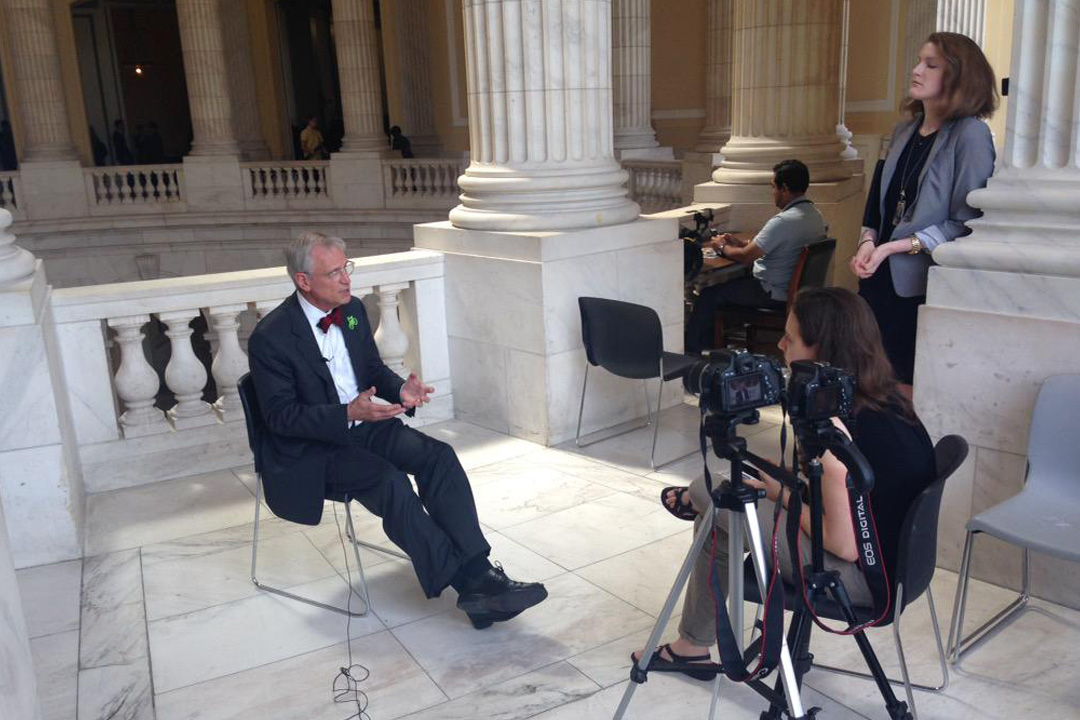“Don’t ask questions, but you’re applying,” Professor Mike Shanahan said on a Monday afternoon last October.
I was sitting in his office in the Media and Public Affairs building, where I had just told him I felt conflicted over where to apply for summer internships and jobs. He convinced me that applying to News21, a fellowship program for top journalism students and recent graduates, was an opportunity I couldn’t miss. He had hurried down the hallway to check with Director Frank Sesno that it wasn’t too late for me to apply. The deadline was that day.
“You’re a journalist. You know how to write on deadline,” Shanahan said, sending me from his office to fill out the application.
Nine months after his passing, I couldn’t be more grateful for that caring push from Professor Shanahan.
I spent eight months as a fellow for News21, a national investigative reporting initiative based at Arizona State University’s Walter Cronkite School of Journalism and Mass Communication. The 2015 News21 project’s focus: the legalization and regulation of recreational and medical marijuana in the United States.
In the spring, I completed a weekly online seminar with Leonard Downie Jr., the vice president at large and former executive editor of The Washington Post who is now a Cronkite professor and News21 editor. We delved into the issue of marijuana legalization, broke into teams and began our research, and learned about investigative reporting from the journalist who helped oversee the Post’s Watergate coverage. Speakers for the seminar included Bob Woodward and the Post’s investigations editor, Jeff Leen.
In the summer, I went to Phoenix, Arizona and worked full time for 10 weeks with 26 other fellows from 18 other universities on “America’s Weed Rush,” an investigation into the legalization of marijuana across the country. As a collaborative project with a heavy focus on multimedia, News21 fellows had a variety of specialties including writing, videography, photography, data and web development. We divided into reporting teams based on our interests and skills. Those teams traveled to about half the states, together producing over two-dozen written stories, 50 videos and a dozen graphics. We tried to cover as many aspects of the issue as possible: from politics, law enforcement and culture to research, business and medicine.
As the leader of the national politics team, I found and interviewed activists, politicians, government officials, lobbyists and experts. Two other fellows and I sought to measure the momentum of the marijuana legalization movement, with a focus on the strategies and tactics of marijuana policy reform organizations heading into 2016. We tried to answer a question: How, if at all, are pro-legalization groups driving changes in marijuana laws?
We found that such groups have had more success as they’ve fine-tuned their message and secured financial support. With words of advice from our editors, including Pulitzer Prize-winning data journalist Steve Doig and investigative reporter Evan Wyloge, we combed through public opinion polls, tax forms, lobbying data and campaign finance reports. Our final story gave an in-depth look into the legalization movement and its priorities.
My other story for News21 focused on D.C., where marijuana possession and use is legal for adults but recreational pot sales remain illegal. One of my colleagues and I spent a week in the District attending events for activists and business people. We spoke to entrepreneurs, politicians, reform group leaders, lawyers, dealers, growers, medical marijuana patients and police about what kinds of opportunities and limitations the legalization of marijuana in D.C. has created.
Every year, News21 partners with national and regional media organizations to distribute its stories. The Washington Post, the Center for Public Integrity, the New England Center for Investigative Reporting and several other major news outlets published my work.
That wouldn’t have been possible without Leonard Downie Jr., the editor for my stories, Jacqueline Petchel, News21’s executive editor and an award-winning investigative reporter and editor, and Christina Leonard, News21’s assistant editor. Each sat down with me on multiple occasions to go over my work. They left all the editing to me, which made me feel like I had true ownership over my stories. Through my editors, I was able to zero in on my strengths and weaknesses as a journalist. They served as models for teamwork and critical thinking, while at the same time keeping my spirits high with a warm sense of humor.
During the summer, I helped manage News21’s social media accounts – posting daily to Facebook, Twitter and Instagram. I wrote posts for our blog, which for the first time featured a weekly podcast. I also worked with the team that designed the website for our final project: weedrush.new21.com.
There’s a lot of content to take in, so I recommend you start with these pieces:
- “Resolute parents demand marijuana treatment for children” (Story)
- “Vashon Island: Growing legal pot in paradise” (Video)
- “Marijuana possession arrests charted over three decades” (Data)
- “What do Americans think about Mary-Jane?” (Stop-motion video)
- “Marijuana-related Stop, Question and Frisk activity” in NYC (Map)
- “Marijuana-centric tweets by opinion” (Graphic)
Brianna Gurciullo graduated with a bachelor’s degree in journalism and mass communication in May. She now reports on money in politics for the Center for Responsive Politics.


